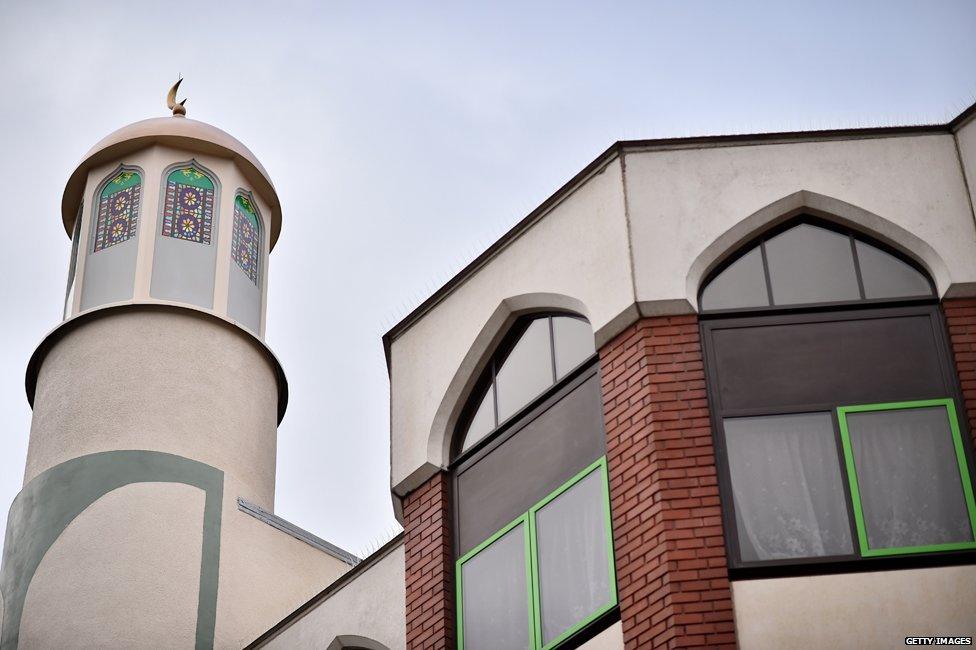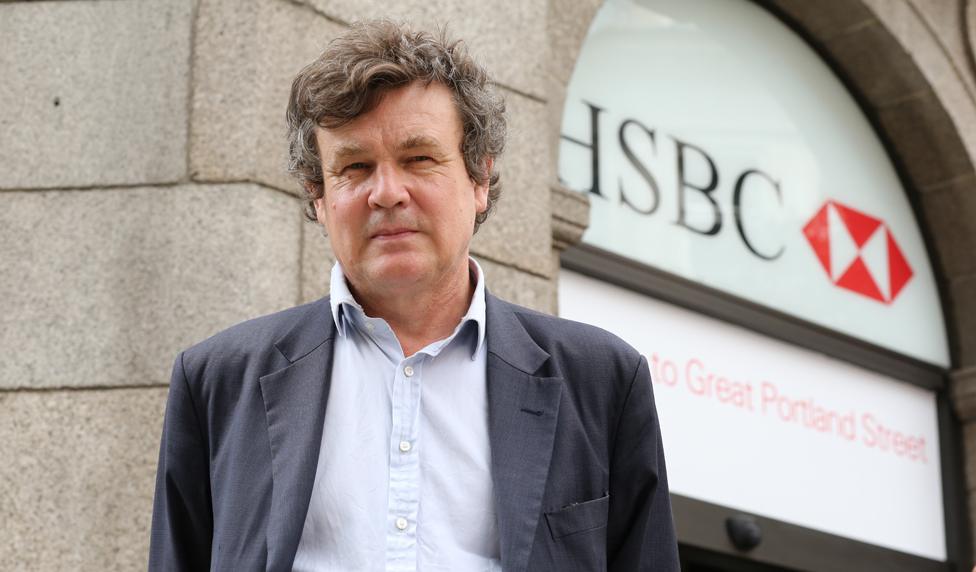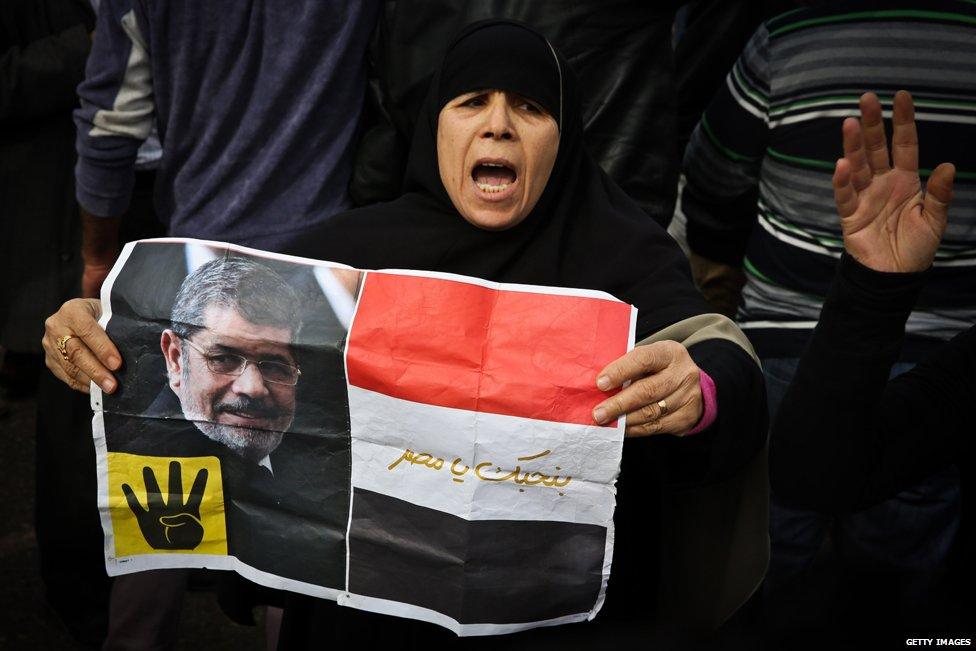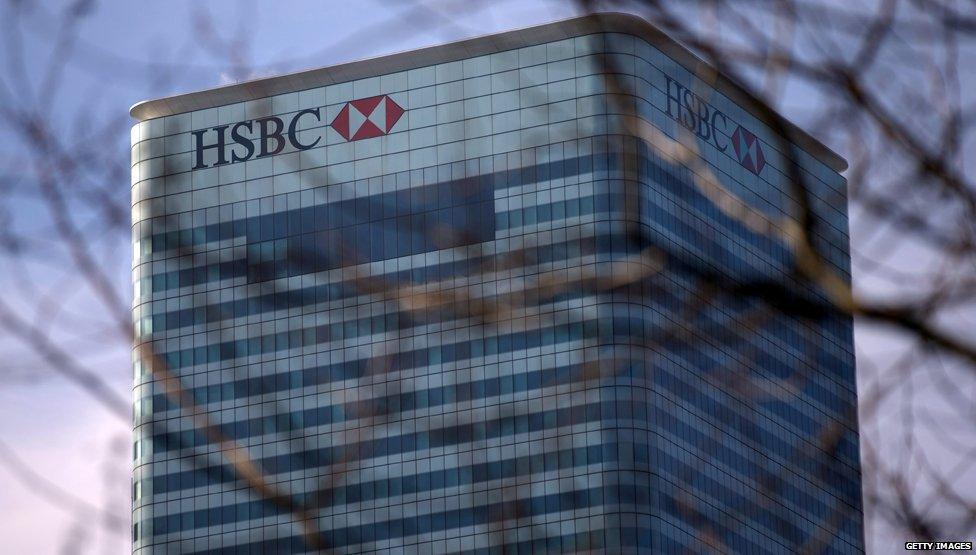Why did HSBC shut down bank accounts?
- Published

Finsbury Park Mosque
Last year international banking giant HSBC suddenly closed the bank accounts of several prominent British Muslims. Anna Meisel and Peter Oborne reveal how the decision was made.
In late July last year Mohammed Kozbar, chairman of the Finsbury Park Mosque near the Emirates football stadium in north London, was astonished to receive a letter out of the blue from his bankers, HSBC.
The letter informed him that his bank account was to be closed. It explained: "HSBC bank has recently conducted a general review and has concluded that provision of banking services to Finsbury Park Mosque now falls outside of our risk appetite."
There was no further explanation and no right of appeal. Kozbar says that there had been no previous issues between the mosque and HSBC and that he "couldn't understand" what had happened.
Several other Muslim institutions and individuals received the same letter from HSBC, each one dated 22 July 2014.
Other HSBC clients who suddenly fell outside the bank's "risk appetite" included the Cordoba Foundation, a think tank which says that it specialises in building relations between the Muslim world and the West.
Anas Altikriti, the foundation's chief executive, had banked with HSBC ever since he had been a university student 30 years ago. His personal bank account was closed, along with his wife's and his two teenage children. Once again there was no right of appeal.

About the author

Peter Oborne is is the associate editor of the Spectator. He resigned from the Daily Telegraph after the newspaper failed to publish an article about HSBC's closure of accounts
HSBC, Muslims and Me is on BBC Radio 4 at 20:00 BST on Tuesday 28 July or catch up later via iPlayer

So what happened and why were the accounts closed? When we started to investigate we ran up against a wall of silence.
HSBC refuses to discuss the bank account closures. But we learned about World-Check, a confidential database owned by the financial information giant Thomson Reuters.
World-Check is used by 49 out of the largest 50 banks in the world to help them judge who to take on, or to retain, as clients.
In the post 9/11 world, banks are required to know their customers and can be held responsible if their clients are involved in financing terror or money-laundering. To avoid this, the banks rely heavily on databases like World-Check.
Journalists cannot get access to it but one of their clients - who had strong reservations about the software - let us in. When we obtained access to the database, the word "terrorism" came up in dark red, directly above the name of the Cordoba Foundation.
The World-Check website page sourced the "terrorism" claim to the United Arab Emirates. The UAE lists the Cordoba Foundation as a terror group.
One of the smaller Gulf states, the UAE has itself been the centre of money-laundering allegations. It has been criticised for human rights abuses, including torture. It brands certain political opponents - including the Muslim Brotherhood - as terrorists.

The Muslim Brotherhood

A Muslim Brotherhood supporter holds a placard showing ousted president Mohamed Morsi
The Muslim Brotherhood is an incredibly complex movement which manifests itself in different ways in different places - it is not a single uniform body, writes Dominic Casciani.
Islamism, the idea that society and politics should be entirely organised according to the teachings of Islam, is at the heart of its ideology.
In Egypt, where it was founded, and Saudi Arabia, it is banned as a terrorist organisation - something its supporters say is unjust. Its core strategy - of mixing charitable work with political activism, has influenced the approach of many comparable Islamist groups around the world.
There are a string of groups operating legally in the UK that are part of the movement, even though they don't often explicitly describe themselves as being part of the Brotherhood. Some individuals involved in these groups have been accused of extremism - such as supporting suicide attacks by Palestinians against Israel - and many have been involved in mainstream political campaigning. Prime Minister David Cameron ordered a review of the Brotherhood in 2014 but its findings have still not been published.

Anas Altikriti is one of the most prominent Muslim Brotherhood supporters in Britain. His father was one of the leaders of the Brotherhood in Iraq.
The World-Check website contained several strong disclaimers, and stressed that the "accuracy of the information found in the underlying media sources should be verified with the profile subject before any action is taken". Furthermore, World-Check stressed that the decision to open or close accounts lay with the banks.
World-Check also listed Finsbury Park Mosque under the category "terrorism". In the case of the mosque, World-Check dealt in detail with the period when it was under the control of Abu Hamza, an al-Qaeda-sympathising cleric with proven links to terrorism.
However, a new management committee, led by Mohammed Kozbar and with the tacit approval of the Metropolitan Police, took over the running of the mosque a decade ago.
There have been no further suggestions of terrorist involvement. Though this information was included by World-Check, it took careful reading to get to it.
World-Check's profiles are created from publicly available information of the kind that anyone can access. However it is not clear that banks can always reach an informed decision about clients based on the World-Check information.
Questions also surround World-Check sources. On examination of the website, we discovered information from Wikipedia as well as blogs (for instance Muslim Brotherhood Watch) and the news agency WAM, which is close to the UAE government.

HSBC headquarters
When we put this to World-Check they said that: "World-Check uses only reliable and reputable public domain sources (such as official sanctions lists, law and regulatory enforcement lists, government sources and trustworthy media publications) for risk-based information or allegations about an individual or entity.
"We also provide secondary identifying information on individuals, such as dates and place of birth, and this will be similarly verified with reputable and official sources. If blog content appears, it is only as a supporting source for that secondary information, and is clearly identified as such."
The World-Check entry on Finsbury Park Mosque also contained the information that Mohammed Sawalha was a trustee. Sawalha is believed to be one of the most senior Muslim Brotherhood figures in Britain. He is also alleged to have been a Hamas commander in Gaza, external 25 years ago. Hamas is designated by the US and other governments as a terrorist organisation.
But Kozbar said that Sawalha had been a trustee ever since the new management board was configured 10 years ago, with the approval of the police.
Kozbar is shocked that World-Check listed his mosque under the designation "terrorist". He says: "We never got this information before and we never thought that still Finsbury Mosque [is] considered as a terrorist place."
The episode has inflicted reputational damage on the Finsbury Park Mosque, which found it impossible to get a bank account with another High Street Bank, he says. It now banks with a small Islamic bank.

HSBC refuses to answer questions about the closures. But it insists: "When we review a customer relationship we typically gather information from a wide range of sources and take a number of factors into consideration. Although we can't always provide customers with specific reasons for closing an account, any such decisions are not taken lightly and are not based on a customer's race or religion.
"We are committed to working with the UK government and industry bodies to support the not-for-profit sector and to help charity customers manage risk in their operations."
We also discovered a connection between David Cameron's decision to review alleged Muslim Brotherhood links with terrorism, and the decision by HSBC to close down the bank accounts of several politically active British Muslims.
British government anxiety about the Muslim Brotherhood - as well as panic over the emergence of the Islamic State group - caused banks to conduct examinations of their clients in the early summer of 2014.
According to one senior government official: "There is a definite connection between the bank account closures and the review of the Brotherhood."
Experts within the banking industry have confirmed that the Brotherhood review created an atmosphere of concern - though they added there was no pressure from government to close accounts.
Cameron's review, which focused in part on the connections between the Brotherhood and terrorism, was announced in April 2014. Just three months later HSBC sent its letters to well-known British Muslim organisations and individuals.
The bank account closures were especially odd because counter-terrorism legislation gives the British authorities power to freeze the accounts of individuals or organisations which are suspected of being implicated in terrorism.
But this action has not been taken against any of the organisations whose bank accounts were closed by HSBC.
There is a deeper and more troubling context here.
By sending the message to law-abiding Muslims that they are excluded from the simple privileges enjoyed by all other British people, we risk encouraging rather than suppressing extremism.
Subscribe to the BBC News Magazine's email newsletter, external to get articles sent to your inbox.